The digital election: 10 things we've learned so far
Throughout the election campaign I've been keeping up a digital election timeline, making a note of interesting bits of campaigning on the web by the parties, digital coverage by the media, and the odd bit of mischief from the collective hive mind of 'teh interwebz'.
With tonight's second leader's debate sure to unleash another wave of interactivity, here are some of the things I think we've learned about a 'digital election' so far...
1. Scrub your social media profile clean
Before you stand as a PPC, you better be sure there is nothing dangerous lurking in your online history, as Stuart MacLennan, Paul Wiffen, Charlotte Lewis have found to their cost. All those incidents illustrate a fault line between our established politics and media, and a web savvy electorate.
You can't tell me that when Jack Straw was officially a Communist sympathiser, or George Osborne was in the Bullingdon Club, that they wouldn't have expressed views that would now look extreme. And they possibly also used naughty words. If either of them had been able to blog at the time, it might well have rendered them unelectable now, just as this Andrew Neil interview with Chris Mounsey focussed on his abrasive psuedo-anonymous blogging style as Devil's Kitchen.
I'm not sure this is a long term strategy for the parties.
For every Stuart MacLennan career Twittercide to rejoice in, there is an 'amusing' blacked-up Facebook picture set to turn up. Each time you delight in the other's web misfortune as 'showing bad judgement' and 'the real face of the party', it makes it harder to excuse your own.
If they are not careful, the major parties will find themselves in a position where they cannot have as a PPC anyone who ever had an Internet social media presence between the ages of 12 and 24, or has ever been involved in political blogging. It isn't going to be long until that will just be about everybody who is interested in pursuing a political career...
2. Some bits of old media really don't want it to be a digital election
There have been quite a few comment pieces along the lines of "this Internet thing is still a minority pursuit, don't worry, it is us newspapers still in charge of the campaign narrative". I'd go along with that. The digital stories that I mentioned above - Stuart MacLennan, Devil's Kitchen blog - have only really had an impact as a result of exposure in traditional media.
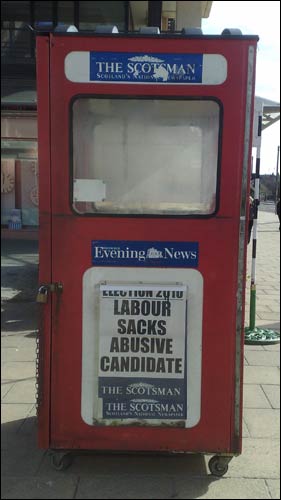
However, I'd be wary of looking like a lady that doth protest too much. The Evening Standard, for example, devoted two whole columns in the same edition to making the same point...
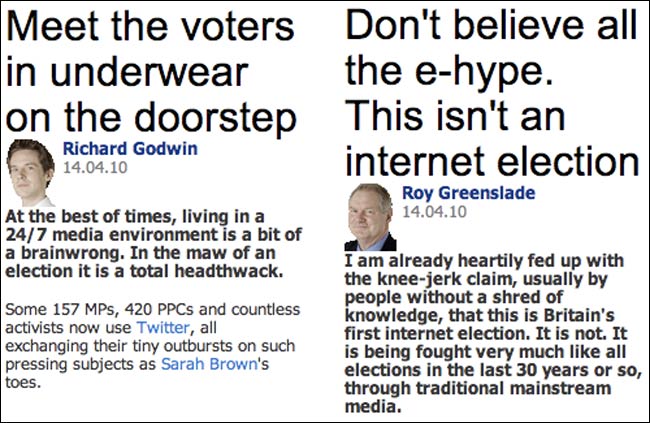
And somewhere I like to imagine that there is still a sweatshop of old school journalists bashing away on typewriters that this new-fangled TV thing will not impact the way elections are reported...

3. Some bits of old media are enhanced by it being a digital election
I've no idea what the viewing figures for the original showing of this excruciating interview with UKIP's Lord Pearson were, but I'm fairly certain they will be eclipsed by the number of people watching the clip online.
4. It is easier to destroy than create
There is almost nothing that the Internet cannot parody effectively in seconds. In fact, there is almost nothing that 'the internet' won't build a tool to enable people to parody in seconds. The Labour Party have even relied on the collective negativity of the web to design a crowd-sourced poster.
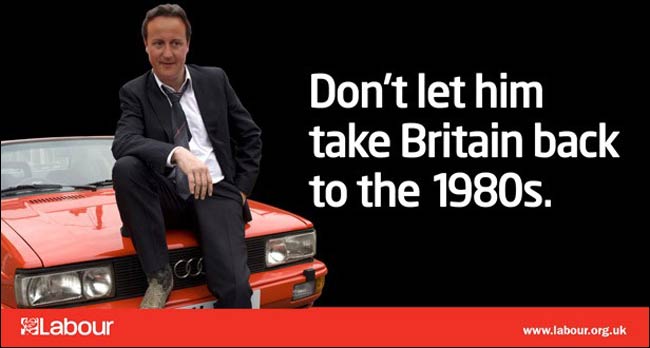
5. Partisan politics creates entrenched views of technology
One of the problems with our adversarial system of politics is that we get ourselves into a situation where parties can never say that somebody else has a good idea, or ever admit they were wrong. This equally applies to tech as it does to policy. When Labour put a Twitterfall of tweets about the first Leader's debate above the fold on their homepage, one leading digital Conservative called it 'the ultimate political echo chamber' and 'madness', when you could equally describe it as 'a bold experiment' and a way of connecting the conversation of Labour activists around the country together. It was particularly odd to see the Conservatives criticise use of Twitter given the #cashgordon shenanigans.
6. C'mon guys. It is 2010. Moderate Twitter when it appears on your site.
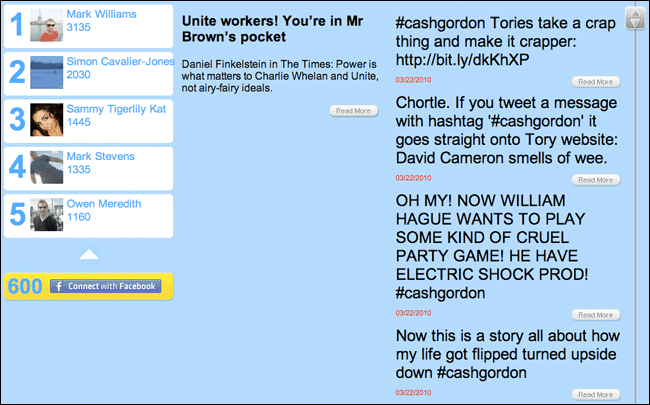
Talking of which, it is 2010. Skittles has happened. There is no excuse for unmoderated tweets being integrated into your site if you are going to be at all squeamish about what might appear. The #cashgordon incident was worrying because it exposed a lack of basic web security knowledge from a party that might shortly be the commissioning power behind Government IT projects, but Sky News also took a risk with initially unmoderated Twitter and Flickr aggregation on their rather good constituency pages.
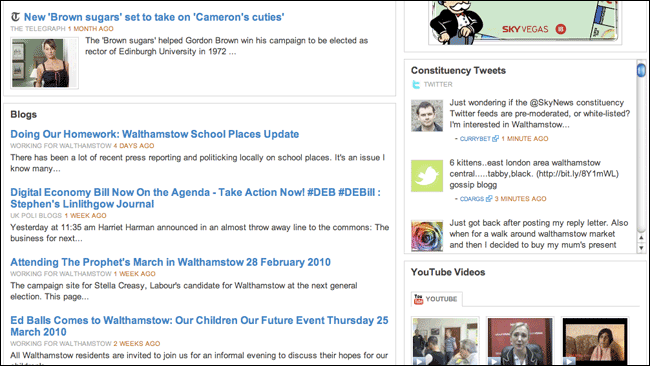
7. Newspapers are (maybe) getting a bit better at technology partnerships
It is very easy in a traditional news organisation to start suffering from "wasn't invented here" syndrome. This campaign, though, I've seen lots of examples of newspaper websites using distributed tools like CoverItLive (The Times, The Mirror) or Scribed (The Guardian), or partnering with specialists like MySociety (The Guardian) or SalesForce.com and VoteMatch (The Telegraph).
8. All is fair in love, war, elections and online voting...
The parties haven't been above a bit of 'internetery-jiggery-pokery' as Nicky Campbell once called it. Or online ballot stuffing as I know it.
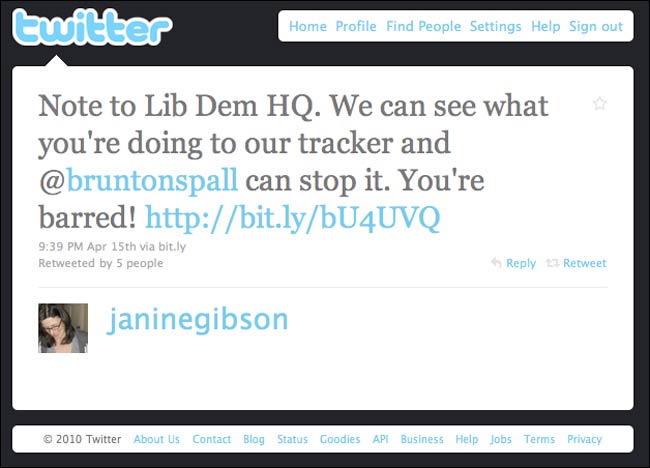
9. New media tools bring about greater national transparency for local issues
Mad independent candidate quoting the racist Protocols of the Elders of Zion forgery? Dreadful BNP pun or spelling mistake? Strangely creepy picture of you posing with school girls? Odd design choice of the Tiksels/proto-ASCII art style? Decided you don't need the votes of any Evertonians? Directly played the Muslim, Iraq War & Israel card?
What would once have only been seen by the thousands of people who had it stuffed through their letterbox can now be examined nationwide.
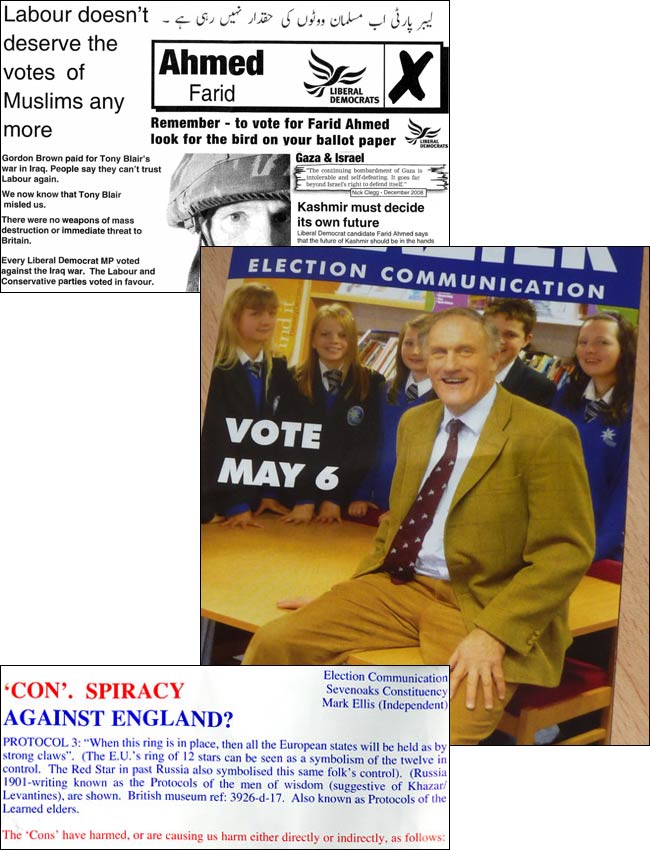
10. I can't imagine a previous election campaign where you would have got this...
I'll be publishing parts four and five of my Q&A interview with young journalists Helia Phoenix, Priyal Sanghavi and Ann Danylkiw next week.
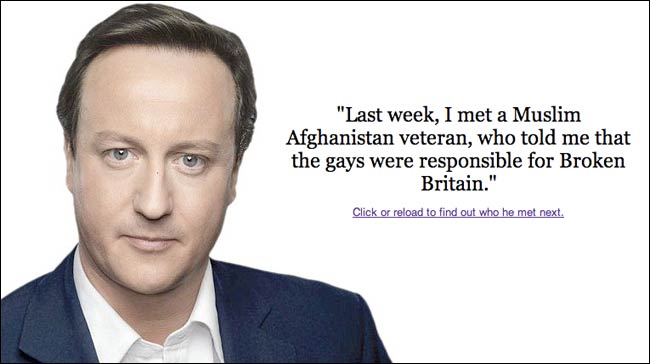
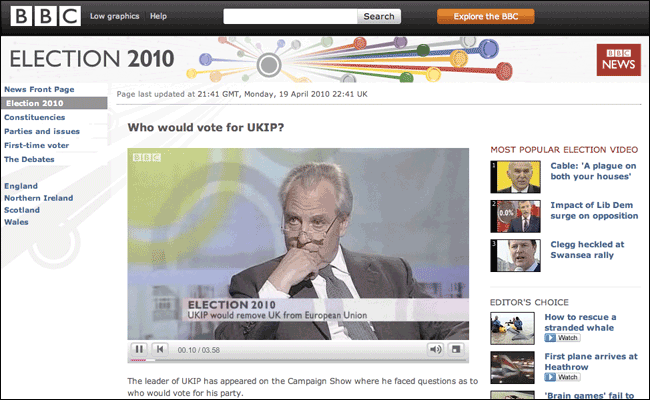
Excellent post. One of the probems with the "old" media coverage of the "internet election" is that they go looking for big, one-off events that have supposedly been "caused" by the internet in some crude and instrumental sense. They tend to miss the underlying processual changes.